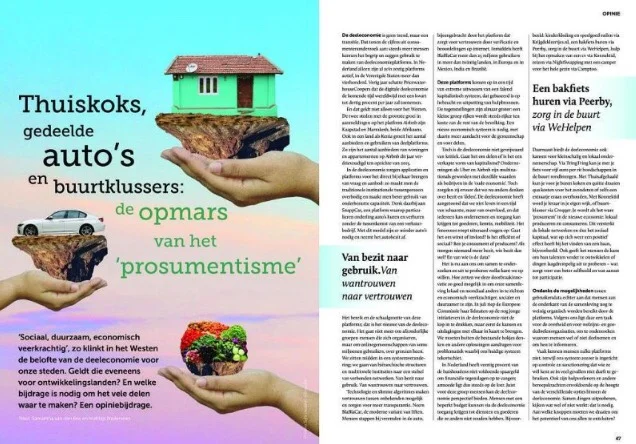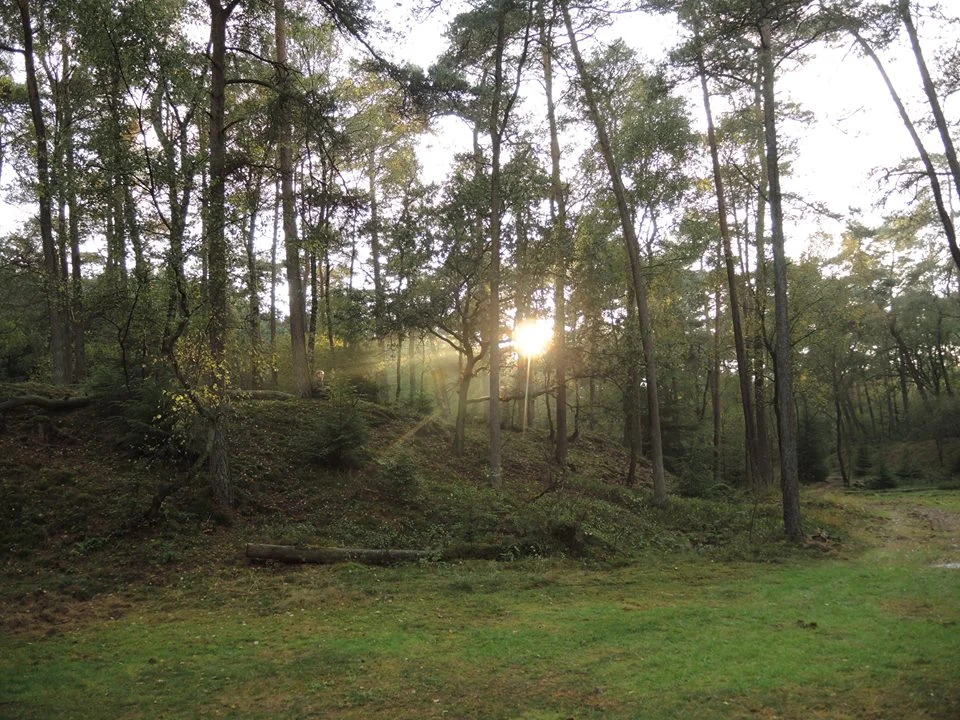In order to determine what way a future with Artificial Intelligence is going, it is important to first look at the things we see happening in society as a whole. We looked out for products and services with future potential and connected them to shared values to spot trends. These trends are focussed on the near future since the first signs of them are already visible in the world we know today. Nonetheless they might become bigger over time as the drivers behind them evolve. For now, let’s see what is ahead is of us starting with; A human form of tech!
Read More
De zelfrijdende auto maakt rijden zo gemakkelijk, dat files, vervuiling en druk op de openbare ruimte alleen maar toe zullen nemen, betogen Anne Knol van Milieudefensie en Ananda Groag van ShareNL. Tijd dat beleidsmakers werk maken van het delen van auto's.
In recent years local governments in the Netherlands, most notably in the city of Amsterdam, have been very active on creating a well-functioning sharing economy ecosystem. This has led to the emergence of numerous successful companies such as Peerby, Konnektid and Snappcar. In Japan similar initiatives are taking place, mainly led by a group of dedicated ‘sharing’ companies. Developments are however still in a rather early stage.
Read MoreOp 31 mei verscheen het rapport 'Eerlijk delen’, op basis van onderzoek door het Rathenau Instituut. Uit dit rapport blijkt eens te meer dat de deeleconomie en de zogenaamde 'kluseconomie' zowel kansen als uitdagingen bieden. Zo genereert de deeleconomie 'werkgelegenheid, stimuleert het ondernemerschap en innoveert het bestaande sectoren,' maar zet de opkomst van online deelplatformen ook publieke waarden onder druk, zoals 'consumentenbescherming, openbare orde en privacy.'
Read MoreA sharing city embraces and monitors the collaborative economy as a means to a more socially, sustainably and economically resilient city. Lately, Amsterdam has received a lot of attention for being a front-runner in monitoring, rather than banning, the sharing and collaborative economy in the city.[1][2][3][4][5][6] Very often, the collaborative and sharing economy is equaled exclusively to Airbnb and Uber, which are portrayed as very problematic for the city and its people. Every story has two sides, and although there are, and will be, challenges with any initiatives, there are also benefits and opportunities. Moreover, the collaborative economy has a much richer ecosystem beyond the typical examples of Uber and Airbnb. These two giants are making up a big part of the discussion, but surely, our scope has to be widened to include other platforms such as for example WeHelpen, Konnektid and Thuisafgehaald (Share your meal).
Read More“Exciting turn ahead” it must say on a traffic sign for those exploring the possible routes to the future of transportation. Technology is about to bring more opportunities for the way we move around than we had in the last century. Since the transition from horse carriages to the automobile changes have been evolutions, but no revolutions.
Now we are at the verge of a true revolution in transportation. Electrification has been slowly entering the market. Where public transport companies have been using electricity for a while, nearly all car manufacturers are now following. Tesla took it from ‘the good alternative’ to ‘the sexy alternative’ to a fossil fuel driven car.
Read MoreIn this month's insights, you can read about:
- The launch of shareBE.
- Sharing Economy and Sustainable Tourism.
- The European Mobility Week kick off.
- Why people actually participate in the collaborative economy.
- The Green Deal day.
- Regulatory framework for the sharing economy.
- The Amsterdam Sharing City International Press trip.
And much more...
Read MoreThis meetup was a deep-dive into the future of the (collaborative) economy, and the future of society. While shareNL has been involved in the sharing/collaborative economy for quite some time now, the blockchain was a relatively new topic. With the aim of reshaping society, it was time to address the potential role of blockchain platform services in the current society. To answer the question of whether the blockchain will live up to its promise to enable a true peer-to-peer network, Pieter van den Glind (shareNL), Samantha van der Bos (shareNL), Perry Smit (Innovationlab of the Chamber of Commerce), Chris Huls (Rabobank), Jeroen Rijnbout (BITONIC), and Robert-Reinder Nederhoed (blandlord.com) provided us with insights into the possibilities of blockchain technology.
Read More“All the modern technologies have only let us work more, and work harder.” This is a popular statement these days, but they do not fit well with the actual numbers. Tools and machines have made us faster and stronger. Digital technologies have made us smarter and have let us communicate faster. Over time, technologies have dramatically increased our productivity. Today, we get more done in less time. Our output has increased both at the workplace and in the household.
Read More‘Social, sustainable and economically resilient’, that’s the promise of the sharing economy for our cities in the West. Is this also the case in developing countries? And what is needed to become a true sharing society? An opinion column.
Read MoreDoor Pieter van de Glind, Edward Zevenbergen en Sander Klaver*
De afgelopen jaren zijn we steeds meer zaken online gaan delen; het begon met muziek, verhalen en foto’s via sociale media. Daarnaast zijn we meer en meer spullen van elkaar gaan kopen via sites als marktplaats. En vandaag dringt de snel opkomende ‘deeleconomie’ in steeds meer sectoren door: we delen onze woning via Airbnb, spullen via Peerby, energie via Vandebron of Powerpeers, kennis via Konnektid, eten via Thuisafgehaald, ritten via Blablacar en auto’s en parkeerplaatsen via platformen als Snappcar, MyWheels en Mobypark. Zo krijgen steeds meer Nederlanders toegang tot elkaars spullen en diensten. Eén op de vijf Nederlanders maakt gebruik van online deelplatformen (inclusief Airbnb en Marktplaats.nl). Voor de opkomst van de online deeleconomie deelden mensen vrijwel uitsluitend eigendommen met vrienden, familie en kennissen. Uit onderzoek komt naar voren dat het percentage Nederlanders dat er geen probleem mee heeft spullen met vreemden te delen in de afgelopen 3 jaar is gestegen van 10% naar ruim 30% . Lees meer...
Read MoreWith a world around us transforming by the second, it is very unlikely we are able to predict the future our children will grow up in. To prepare for this uncertain reality, children should be handed not only the right tools and skills to be able to manoeuvre their way through - such as the use of tablets, 3D printing, coding, design thinking - , but they should also be equipped with the right 21st Century mindset. Read more...
Read MoreCities battle many challenges, and recourses are often scarce to address these. Born out of issues that cities face and combining it with the collaborative economy, is what we like to call the Sharing City. Why should your city start using sharing to your advantage and work towards becoming a sharing city?
Read MoreA brand new newsletter to wish you all the best for 2017, and to provide you with the latest insights!
Read More‘Sociaal, duurzaam, economisch veerkrachtig’, zo klinkt in het Westen de belofte van de deeleconomie voor onze steden. Geldt die eveneens voor ontwikkelingslanden? En welke bijdrage is nodig om het vele delen waar te maken? Een opiniebijdrage door Samantha van den Bos en Matthijs Nederveen, oorspronkelijk gepubliceerd in Vice Versa (22 december 2016).
Read MoreStel, je hebt een prachtig idee voor een platform. Hoe breng je je startup van de grond? Lynda Provoost vertelt hoe startup MotoShare het ervaart om via een deelplatform haar financiering rond te krijgen: zij kozen ervoor om crowdfunding in te schakelen. Momenteel zitten ze in de laatste fase. Lees meer...
Read MoreBy Lies van den Eijnden
Our last Meetup of the year was a full house with speakers representing a variety of stakeholders, from the government, start-ups, a traditional corporate to the press. Read more..
Onlangs was ik drie dagen in de wildernis. Gebruik maken van minimale spullen. Een spannende, maar heerlijke tijd. Maar dan ga je terug naar je dagelijkse bestaan, terug naar de stad. Ik verwonderde me, walgde zelfs van de stapels met nutteloze spullen die in elke winkel tot het plafond reiken. De afschuw maakte snel plaats voor de realisatie dat ik er niet boven sta, niet beter ben, maar dat ik onderdeel ben van deze overvloed. Er is een mooie manier om deze controverse tussen overvloed en schaarste te benutten en doorbreken: de deeleconomie. Lees meer...
For English, see below
This year, the team at shareNL contributed to a research project by the JRC namely the ‘The future of the EU collaborative economy – 'Using scenarios to explore future implications for employment’. Now, the European Commission released the ‘JRC Science for policy report’, and we summarize the highlights here. For full report, click here. The report emphasizes the importance of acknowledging both opportunities and challenges that this new economy brings and suggests concrete areas and issues that need to be considered in order to foster continued growth of the collaborative economy.
Read More




















